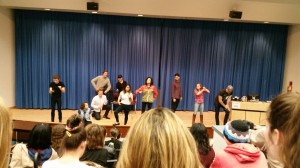I really like improvs.
Improvs are comedy shows with no script provided, where actors perform their acts by improvising on the spot.
My first experience of watching an improv show was in elementary, where a group of famous improv team visited our school to perform. The experience was mind blowing and since then, I became very interested in the subject. When I was in first year at UBC, I remember watching UBC Improv at our residence, as part of the first week program. I also went to their weekly improv shows, hosted at the Neville Scarfe building. And last Friday, I visited the site again, as an excuse for my blog assignment.
The room was filled with people and laughter was spread out through the room. Once again, I was amazed by how clever these actors were, as they related their skit to themes thrown out by the audience, built and changed their identities according to the situation and concluded by bringing together all the odd and irrelevant characters and situations to one plot. Their characters, use of language and action were rewarded by laughter and applause from the audience. The audience themselves seemed to be very energetic and engaged. What was significant though, was how this space was created.
In Razack’s article, “Race, Space, and the Law: Unsettling a White Settler Society”, she investigates how bodies are produced in spaces and how spaces are produced by bodies, based on Henri Lefebvre’s concept of space as a social product, where appropriate places to social relations are assigned, which could be served as a tool of thought and action, and as means of production, control and power.
I knew that Scarfe 100, where UBC Improv took place, was a social space because it was constructed by actors and audience who seeked for this space. The space was not randomly created but seeked by students, adults, friends of actors, and others who understood the language, understood the culture, therefore, understood the humour. I was interested in how this space was produced and how this space could influence bodies like the actors and myself, performing and watching the show.
As the show preceded, I realized that it was the actors’ efforts that created the space of engagement and acceptance. In situations where actors blanked out, other actors would immediately jump in to improve the situation or laugh at each other to promote laughter from the audience. Engagement from the audience were encouraged by actors as they would challenge the audience with statements like “I can’t hear you!” And by waiting for appropriate themes to be shouted out. I know I am not usually an outgoing person, but I found myself quite actively engaged in the performance.
The identity of this space is also uniquely constructed. What attracts people to watch improv shows is the notion that anything can happen in these shows. Basically, anything out of the norm in society is the norm within Improv shows. Gender switches, talking animals, illuminati invasion are all commonly played out. Comedy shows like improv are also one of the few spaces where social taboos and political injustices can be performed without serious consequences. This is because of the notion that comedy shows are performed solely for humour purposes and not to be taken seriously. I mean, can you really arrest a comedian? This gives power to comedians to challenge existing social inequalities in a seemingly light hearted, comical way. Historically, comedy shows were used by the powerless of society to voice their opinions, to influence and educate communities, on these social taboos and political injustices.
This reinforces Lefebvre’s idea that spaces are socially constructed, served as a tool of thought and action, and empower the users of the space.
However, because of this notion, there is definitely a burden on the actors’ shoulders. Improv actors are expected to be creative and funny while managing through a fine line of appropriate/inappropriate social taboos. They are encouraged to include social taboos in their acts but must be aware of the negative reactions when it is taken too far. For example, a white guy at the show provoked a lot of laughter from his character of being an ignorant American who always orders burgers at a Mexican restaurant. However, I believe this reaction would have been different if the same guy played the American who orders black people to serve him burgers. Since there is no script provided, every actor becomes responsible for their act.
Nevertheless, I have always been a big fan of improv and I encourage you guys to take part in the improv workshops, hosted by UBC Improv, as you will experience creating a small social space of your own, from attending to acting your own skit.
References:
Lefebvre, Henri, The Production of Space, Blackwell, 1991
Razack, Sherene, Race, Space, and the Law: Unmapping a White Settler Society, Between the Lines, 2002
